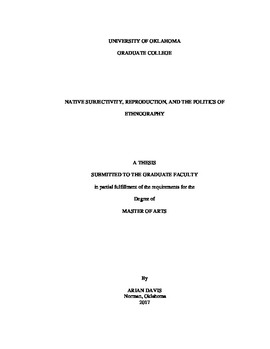| dc.description.abstract | Birth and child-rearing have long figured as premiere sites for social scientific research. As Rapp & Ginsburg (1995) argue, anthropological inquiry into reproduction provides a unique opening for the study of socio-political processes more generally. Through closer attention to the intimate registers of reproduction, we are able to envision how cultural forms and processes are created, negotiated, and inscribed onto bodies, and to account for what is at stake in the ways such dynamics change over time. The concept of subjectivity provides a particular lens through which to explore these questions of reproduction. While anthropologists have frequently engaged the topic of how reproduction relates to social or communal, less work has been done on how women are individually created as social and legal subjects through their reproductive experiences. The question of how reproductive subjectivities are formed and negotiated takes on an additional layer of complexity within the context of Native peoples undergoing continued settler colonialism and the colonial category of Nativeness itself. The ongoing governmental management of Nativeness means that mothers of Native children are the reproducers of not just flesh and bone and blood but also of specific biopolitical structures and categories of being. This thesis questions how interwoven systems of bodily and cultural intervention exist in tension with women’s own reproductive subjectivities, particularly for Native women. I detail how the multiplicity of Native reproductive subjectivities makes it difficult to define exactly what Nativeness is, how it is reproduced, and what it means for larger questions about the nature of personhood and community in Native contexts. Additionally, through an exposition of my ethnographic journey, I illustrate both the limitations of ethnographic inquiry in contemporary biomedical contexts and the ways in which such a methodology allows a unique opening into the nuances, challenges, and potentials of larger systems of modern life. Finally, by engaging the concept of subjectivity in relation to Native reproduction I aim to demonstrate how moving from identity towards subjectivity can open up new ways of understanding reproduction as a socially, politically, and technologically fraught experience. | en_US |
